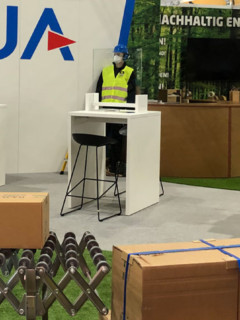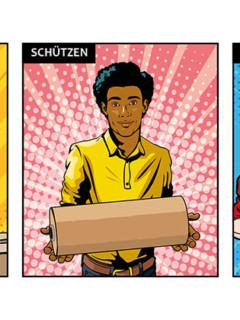Women in management positions – what is far from being a reality in many companies is, to a large extent, lived reality at the RAJA Group. On today’s International Women’s Day, RAJA is a good example of courageous women in leadership positions and motivation for many other female founders and women who aspire to a career. Because in many places there is still a need to catch up in terms of equality between men and women. This is another reason why the RAJA Group is committed to the greater emancipation of women.
Gender Gap Report
Men and women with equal rights in work, family and society – that is the ideal. However, women are still at a disadvantage, especially in professional life. It is true that equal rights for men and women have been enshrined in Article 3 of the Basic Law since 1949. However, the reality continues to show differences between the two sexes and it is mainly men who make a career and sit on the executive floors.
While there are equalisations and efforts to achieve such, the Gender Gap Report 2020 of the World Economic Forum (WEF) also shows:
An almost sobering realisation, considering how great some of the inequalities are.
The “distribution” in the labour market
The figures in the free economy are therefore not surprising. In 2016, only 26% of top-level managers were female. This is revealed by a Study by the Institute for Labour Market and Occupational Research study from 2016 reveals. In the 200 largest companies in Germany, it is even only 8.3 %. So there is still a lot of catching up to do here. Without the equal inclusion of women, national economies cannot grow and the UN’s sustainability goals cannot be achieved.
RAJA Germany is still a long way from where we want to be:
And globally?
Currently, Germany is only in 10th place in the worldwide ranking of the Global Gender Gap Report 2020, with Iceland leading the way, followed by Norway and Finland in second and third place. Iceland in particular is setting a good example and has closed the gender gap by almost 88%, while in Germany the figure is only 78.8%. In a global comparison, however, Germany is still in a good position. Especially in developing countries, 10% of girls and young women between the ages of 15 and 24 are still illiterate.
This is the focus of the Foundation
- Supporting women in defending their rights and combating violence: The Foundation works to defend women's rights and oppose discrimination and physical, sexual and psychological violence against women. To this end, the projects concretely support work to address the challenges to women's dignity and integrity through prevention, support and reconstruction. Special attention is given to vulnerable groups such as refugee women, homeless women and women with disabilities. Some of the projects supported include awareness raising and advocacy at home and abroad.
- Promoting education and social inclusion for women and girls: The Foundation aims to address the many forms of exclusion and discrimination faced by women in order to ensure access to education, overcome barriers and end social isolation. Working with project teams, the Foundation provides access to education and essential social services to women and girls who are deprived of these rights because of their gender or because of economic and cultural barriers. Education is widely recognised as a key factor in empowering women - and disadvantaged groups in general - but also an essential tool in combating exclusion and gender stereotypes.
- Promoting women's professional integration and financial independence: The Foundation supports projects to strengthen women's financial autonomy. The aim is to help women become more independent, provide for their families and find their place in society by completing vocational training and finding work or starting their own businesses. Progress in terms of quantity and quality of employability is very important both in the world and in France. It is therefore a question of giving everyone access to training tailored to their needs and skills, but also to the needs of the market, in order to facilitate women's access to work in all sectors.
- Strengthening the role of women in environmental protection and the fight against climate change: The Foundation promotes the role of women in environmental protection and the fight against climate change, including the promotion of sustainable agricultural practices, women's access to sustainable energy, natural resource management, waste management and climate change adaptation projects involving women. The foundation focuses specifically on women with innovations and adaptation strategies to conserve natural resources and biodiversity. As the first victims of the impacts of climate change, women also play an important role in implementing concrete and useful solutions to prevent and reduce the consequences of the expected impacts.
The German labour market: A lot has happened anyway
The figures of the worldwide ranking of the Global Gender Gap Report 2020 show: The reality on the German labour market is still very far from real change.
On the other hand, we should not forget what politics and society have already been able to achieve. Until 1977, women needed the explicit permission of their husbands to work at all. Until 1962, women were only allowed to open their own bank accounts with the consent of their spouses. Similarly, married women were not considered legally competent until after 1969. In comparison, we have already achieved a lot.
Above all, greater political participation is driving equality in Germany. Whereas until 1987 there were significantly less than ten percent women in the Bundestag, in the 19th Bundestag about one third of the parliamentarians are women. But: With Angela Merkel, we may have the most powerful woman in the world at the head of Germany, but many public authorities have never been headed by a woman since their foundation.
Women are in no way inferior in education
In terms of education, on the other hand, women have been in no way inferior to men in this country for many years. In 2017, 51% and thus slightly more than half of the first-year students were female. So in terms of education, women have caught up extremely. However, the development of professional activity has stagnated for almost three decades.
A representative survey of the initiative Chefsache survey conducted with the opinion research company Civey even showed that women’s career aspirations have weakened recently. Thus, only a good 30 % of the employed women in the survey want to take a management position or advance further.
Because in 2020, career and family are still opposites that are difficult to reconcile. And the fact that it is still women who have children makes the combination of child and career unrealistic for many women. Because many have feelings of guilt towards their offspring and employers when they want both.
In addition, many women do not return to work under the same conditions after parental leave. Most switch to part-time employment after the birth, but careers are built on full-time jobs. This is partly due to the fact that childcare facilities are not developed enough and flexible enough, which makes it even more difficult to return to a full-time job.
RAJA: A female success story
One such success story is that of the RAJA Group. It starts in 1954 in France with RAchelMarcovici and JAnineRocher and a clever business idea. They sold used cartons, which they could offer much cheaper than new cartons. This is how the distribution company “Cartons RAJA” was born. Soon the convincing product range made it possible to expand the assortment. After only five years, Cartons RAJA already had ten employees and a turnover of 1 million francs.
Change of management and internationalisation
38 years after its foundation, the first change of management is imminent. Danièle Kapel-Marcovici officially takes over the management of Cartons RAJA in 1982 at the age of 36. Over the years, she optimises the company structure and sets up various departments.
After Cartons RAJA has established itself on the French market, the next goal is to become the European number 1 in packaging. With an increasingly diverse product range, Danièle Kapel-Marcovici also decides to rename the company from Cartons RAJA to RAJA.
Between 1983 and 1992, turnover grows from 64 to 316 million francs. The team now numbers 190 employees and RAJA once again wins the packaging industry’s “Oscar” for its PadPak. The product also marks the start of the machines and systems segment.
From 1994 onwards, the internationalisation of the RAJA Group begins with the takeover of Binpac in Belgium. In 1997 and 1998, subsidiaries in the Netherlands and Great Britain follow. Shortly before the turn of the millennium, the German subsidiary RAJAPACK GmbH is founded in Birkenfeld near Pforzheim. The rest is history🙂















